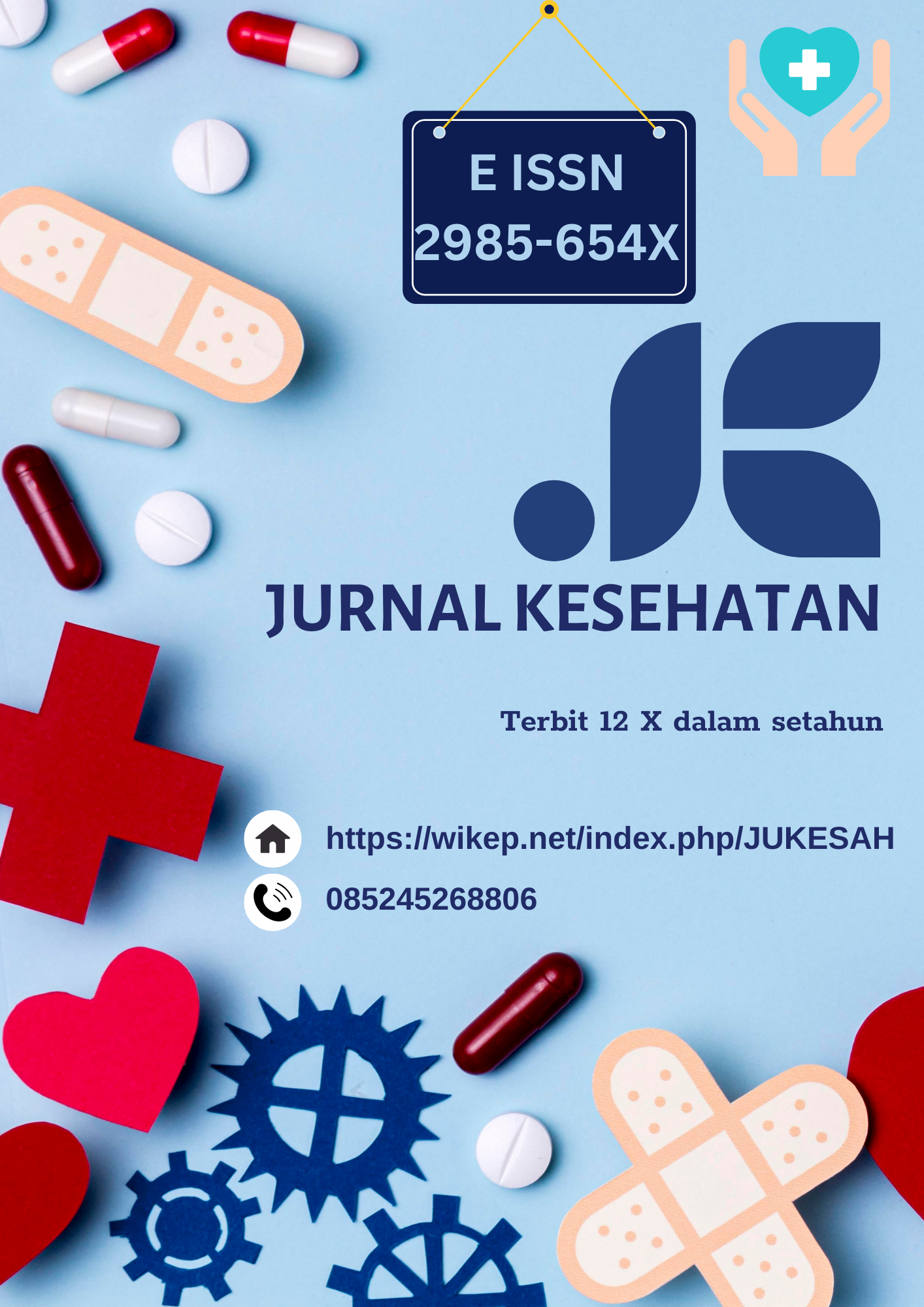PERAN RUMAH SAKIT SEBAGAI PENGENDALI DATA DALAM MENJAMIN KEAMANAN DATA PRIBADI PASIEN PADA SISTEM KESEHATAN DIGITAL
Keywords:
Patient Data Security, hospitals, Data Controllers, Digital Health Systems, Personal Data ProtectionAbstract
Digital transformation in the health sector has brought various conveniences and efficiencies in patient data management, but it has also posed new challenges related to data security and privacy. Hospitals play an important role as data controllers responsible for ensuring that every process of collecting, storing, processing, and distributing patient data remains in accordance with the principles of security and confidentiality. This study aims to analyse the role of hospitals as data controllers in ensuring the protection of patient personal data in digital health systems, as well as to identify challenges and control strategies. The study was conducted through a literature review of various journals, regulations, and reliable documents, using a descriptive-qualitative approach. The results of the study indicate that data protection requires collaboration between the implementation of security technologies (encryption, two-factor authentication, audit trails), compliance with regulations, standardisation of operational procedures, and improvement of digital literacy among human resources. The main challenges include cyber threats, infrastructure and human resource limitations, and suboptimal data security culture. Systematic and continuous efforts in strengthening policies, education, and internal supervision are key to the success of hospitals as data controllers in the evolving era of digital health.
References
Algifari, M. H. (2024). Digital Health Literacy and Its Associated Factors in Indonesia. Indonesian Journal of Public Health, 15(2), 154–165. https://doi.org/10.22146/ijph.5640
Annan, A. (2024). Tinjauan Yuridis Perlindungan Data Pribadi pada Sektor Kesehatan Berdasarkan UU No. 27 Tahun 2022. Synergy: Jurnal Ilmiah Multidisiplin, 1(4), 247–254.
Bonsapia, M. & Jumiran. (2025). Aspek Hukum Telemedicine di Indonesia. The Juris, 9(1), 259–268. https://doi.org/10.56301/juris.v9i1.1636
Dalimunthe, W. (2024). Patient Legal Protection in the Digital Era and Study of Indonesian Telemedicine Regulation. Jurnal Hukum Kesehatan Indonesia, 1(1), 1–10.
Dewi, S. (2025). Perlindungan Hukum Bagi Pasien Konsultasi Online yang Mengalami Kerugian dalam Layanan Telemedicine di Indonesia. Jurnal ISO: Jurnal Ilmu Sosial, Politik Dan Humaniora, 5(1).
Eliyah, E., & Aslan, A. (2025). STAKE’S EVALUATION MODEL: METODE PENELITIAN. Prosiding Seminar Nasional Indonesia, 3(2), Article 2.
Farhan, N. (2023). A Literature Review of Telemedicine in Indonesia: Past, Present, and Future Prospective. Jurnal Administrasi Kesehatan Indonesia, 7(2).
Ferrari, R. (2020). Writing narrative style literature reviews. Medical Writing, 24(4), 230–235. https://doi.org/10.1179/2047480615Z.000000000329
Komala Sari, N. N. W. R., & Griadhi, N. M. A. Y. (2024). Analisis Pertanggungjawaban Hukum Penyedia Layanan Kesehatan (Telemedicine) Apabila Terjadi Kerugian Terhadap Pasien. Kertha Semaya, 12(5). https://doi.org/10.24843/KS.2024.v12.i05.p13
Lestari, H. (2020). Hukum Jaminan Kesehatan Nasional. Pustaka Pelajar.
Listianingrum, D. M., Budiharto, & Mahmud, S. (2019). Perlindungan Hukum Terhadap Konsumen Dalam Pelayanan Kesehatan Berbasis Aplikasi Online. Diponegoro Law Journal.
Nadiroh, A., & Wiraguna, S. A. (2025). Analisis Yuridis Kebocoran Data di Layanan Kesehatan Digital: Studi Kasus Aplikasi Telemedicine di Indonesia. Media Hukum Indonesia, 2(6), 313–320.
Nurhayati, R. H. (2025). Legal Protection for Patients in Telemedic Services in Indonesia. Journal of Legal, Public and Humanity, 5(3). https://doi.org/10.38035/jlph.v5i3.1592
Permana, A. (2024). Perlindungan Hukum Bagi Pasien Telemedicine Berdasarkan UU No. 17 Tahun 2023. Jurnal Kesehatan Digital, 1(2).
Pramukars, D. T. (2021). Perlindungan Hukum bagi Pasien dalam Telemedicine. Jurnal Cakrawala Informasi, 1(2), 51–56.
Purnama, S. (2024). Assessing Telemedicine Demand and Viability in Indonesian Geriatric Clinics: A Comprehensive HOT FIT and Sociotechnical Analysis. Current Aging Science, 18(1), 47–58. https://doi.org/10.2174/0118746098302999240522092726
Putri, A. (2023). Implementasi Telemedicine di Indonesia: Problematika Hukum dan Perlindungan Data Pasien. Jurnal Hukum & Kesehatan, 8(1).
Rahma, D., & Supriyadi, H. (2024). Telemedicine Regulation in Indonesia: Legal Frameworks, Challenges, and Future Directions. Journal of Law and Technology, 7(3), 213–230. https://doi.org/10.33560/jmiki.v13i1.795
Rimbun, L. R., Marisi, E. L. D. D., & Hidayati, T. (2024). Tantangan Keamanan Data dalam Telemedicine: Implikasi terhadap Privasi Pasien dan Kepercayaan dalam Layanan Kesehatan Digital: Systematic Review. Malahayati Health Student Journal, 4(10).
Sari, G., & Wirman, W. (2021). Perlindungan Data Pasien Telemedicine dalam Pandangan UU PDP. Jurnal Komunikasi, 15(1), 45.
Syarifuddin, A. (2024). Indonesian Telemedicine: Between Hope and Legal Challenges. Indonesian Journal of Humanities and Social Sciences, 5(3), 1249–1258. https://doi.org/10.33367/ijhass.v5i3.5936
Undang-Undang Nomor 27 Tahun 2022 tentang Perlindungan Data Pribadi. (2022).
Utama, R. B. (2023). Patient Safety and Legal Certainty on Telemedicine Services in Indonesia. Indonesian Journal of Health Law, 4(2). https://doi.org/10.32734/ijhl.v4i2.10624
Wahyudin, B. (2025). Legal Protection for Doctors in Telemedicine Services: Government Responsibility in Supporting SDGs 3 and 9 in Indonesia. Journal of Lifestyle and SDGs Review, 5(3). https://doi.org/10.47172/2965-730X.SDGsReview.v5.n03.pe05139
Yuliana, D. (2021). Tanggung Jawab Penyedia Layanan Kesehatan dalam Era Digitalisasi.
Yusriadi, -. (2025). Digital Transformation of Health Services in Indonesia Through the Utilization of AI, Big Data, and Telemedicine. 5(1), 85–93. https://doi.org/10.62951/icistech.v5i1.270






